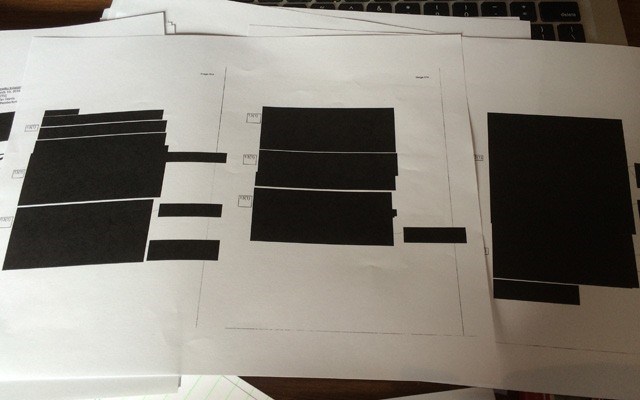A Freedom of Information (FOI) request submitted to the Village of Pemberton (VOP) has come back heavily redacted.
On March 18, Pique submitted a request for emails between the VOP and Vancouver Coastal Health's (VCH) drinking water officer Len Clarkson.
The VOP's response shows a three-page, fully redacted email dated March 10 — one day after the VOP discovered lead in the drinking water of some people's homes, caused by corrosive water leaching metals from pipe fittings, and one day before the village went public with the news.
The email — which Pique has confirmed contains a draft of a press release that was issued the following day, as well as comments about the draft release from officials — was redacted under S. 13 (1) of the Freedom of Information and Protection of Privacy Act (FIPPA).
S. 13 (1) states that a public body may refuse to disclose info that would reveal advice or recommendations developed by or for a public body.
The same FOI request was sent to VCH, though the health authority's response differed in several minor details and didn't include the draft press release, redacted or not.
An information officer with VCH said she misinterpreted Pique's request and would submit another call for records, but wasn't sure why the draft press release was redacted by the VOP, as VCH was fine with it being disclosed.
The FOI responses raise a few issues, said Vincent Gogolek, executive director of the BC Freedom of Information and Privacy Association.
"One of the things that we find sometimes is when you put in the same request to two different public bodies, you get different material, or you get one that comes back and it's got two lines taken out of it and the other one's got two pages taken out of it," Gogolek said.
"Sometimes it's genuine mistakes, or legitimate differing interpretations, but sometimes it's just, yeah, one public body doesn't look as bad when this stuff comes out, so funnily enough they're not interpreting S. 13 as widely as the other one is."
But it's worth noting that the VOP likely doesn't field many FOI requests, Gogolek said.
"This is maybe the first one they've had in five years, and (maybe) you have somebody there who's never done one of these before, so they're learning as they go," he said. "Which raises issues about training, because of course these are our rights. It's our right to information, our right to the protection of our privacy, and you want to make sure that people are up to speed on this."
In terms of the redactions, Gogolek said it's possible that S. 25 of the FIPPA — which states that information must be disclosed if in the public interest — applies in this case.
Pique has requested a review of the redactions with the Office of the Information and Privacy Commissioner, though with its backlog of cases, the file likely won't be reopened for at least six months.
"There's all kinds of things that public bodies can do to try and drag things out," Gogolek said.
"And of course one of the things that they do with the media is move things from current events into history."
When Pique submitted a second FOI request for the emails of former public works manager Lonnie Miller, the VOP said Miller's account was deleted shortly after he left the Village in December of 2014.
"The Village has a limited number of licenses and with new staff joining the Village during this time, it was necessary to free up the email accounts of those employees that have left to make accounts available for new employees," the VOP said in its email response.
The VOP said it is willing to search for emails sent to or received from Miller by current employees, but provided a high-end fee estimate of $450, citing the breadth of the search.
On May 9, the B.C. government announced it will now start proactively releasing information under several commonly requested categories, including directly awarded contracts, ministers' calendars, regular summaries of gaming grants and the status of all active FOI requests received after April 1, 2016.
But the new measures do little to satisfy concerns over how the provincial government has handled its information in recent years, Gogolek said.
"There's not a lot (in the announcement), and a lot of what's in there is stuff that they could have done five years ago, that the commissioner asked them to do five years ago, and they are finally talking about doing it now," he said.
"The main issues that have come up, like the creation of a duty to document, or stiffer penalties for people that destroy information, there's no word about that."
The provincial news comes on the heels of an announcement from the federal government last week that it will now waive all fees associated with federal access to information requests, aside from the $5 application fee — though Gogolek said it would make more sense to have no fees at all, as it actually costs more than $50 to process the $5 application fee, effectively losing the taxpayer money.
"It's a great move, and it's great for requesters, but they've left the $5 in there, which is not a good idea," he said, adding that B.C. Finance Minister Mike De Jong mentioned bringing in similar fees in his press conference announcing the new FOI measures.
"Why B.C. is talking about doing this, I have no idea, other than maybe we're tired of getting so many of those pesky requests, and we're willing to spend $55 of taxpayers' money to process each one of those cheques," he said. "So yeah, we're not happy about that. We didn't see that coming because nobody has been asking for that."




